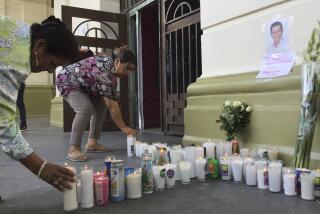‘We Are All at Risk’ : El Salvador’s Mayors Face Guerrilla Peril
- Share via
EL TRANSITO, El Salvador — From this small crossroads town, Mayor Tomas Erasmo Campos has watched as guerrillas threatened, kidnaped and killed the mayors in surrounding communities.
He saw how just before the March elections, they burned the town hall in Santa Elena, to the west, then threatened the newly elected mayor until he refused to take office.
To the north, in San Rafael Oriente, guerrillas kidnaped the mayor for three days--long enough to convince him to move away.
And farther north, in San Jorge, Erasmo Campos saw that the guerrillas killed his colleague, Mayor Mauricio Valenzuela.
But so far, they have not come after Erasmo Campos.
No Direct Threats
“Naturally, I am afraid,” Erasmo Campos said. “We are all at risk. But I have not received any direct threats. If I had been threatened, maybe I wouldn’t have taken my post either.”
Now weakened militarily by El Salvador’s U.S.-backed armed forces, the guerrillas have turned to a campaign of hit-and-run attacks in an attempt to destabilize local governments. Since the beginning of the year, they have burned 32 town halls and kidnaped nine mayors, releasing one of them and killing two others, according to army figures.
Most of the abductions and attacks have occurred in eastern provinces that have been guerrilla strongholds, such as San Miguel, Morazan, and here in Usulutan, about 70 miles southeast of the capital, San Salvador.
The guerrillas have threatened many other mayors in an attempt to prevent them from taking office, and they also have continued a campaign of economic sabotage, destroying electric pylons throughout the country.
The government, meanwhile, appears to be unable to prevent the attacks on the small-town mayors and has advised them to take security precautions.
Small Town Peril
“In the large and medium towns, the mayors are protected,” said an army spokesman, Maj. Carlos Aviles. “But in the smallest municipalities, there are practically no authorities.”
Aviles said that there were no kidnapings of mayors by the guerrillas last year, and only a handful of town halls were burned.
The town hall attacks have destroyed marriage, birth and voting records and have left many towns without city hall services. They also have frightened residents, who publicly will only say that they are frightened but not with whom they sympathize.
“The army comes then the guerrillas comes and they are both armed. We can’t support one or the other,” said a construction worker in Santa Elena’s central square.
Behind him, the scorched town hall was locked. On the wall were graffiti saying, among other things, “The elections, the Christian Democrats and the political parties are instruments of the rich and of the gringos to prolong the war and justify intervention.” It was signed by the People’s Revolutionary Army, one of the five elements of the Farabundo Marti National Liberation Front, which has been battling the government for five years.
The guerrillas opposed the elections that netted 155 of 262 mayors’ seats for the Christian Democratic Party of President Jose Napoleon Duarte. Most of the kidnaped mayors are Christian Democrats.
Visit From Guerrillas
The man who would be Santa Elena’s mayor, Diomedes Lozano, was not at home, but his school-teacher cousin explained that guerrillas scared him out of the job.
“They visited him,” the school teacher said. “Do I make myself clear? They came and said some things to him that frightened him.”
In El Transito, Erasmo Campos said that possibly God, geography and the passage of soldiers have protected him from a guerrilla attack. The town is at the intersection of several roads, and therefore, is frequently traversed by soldiers.
“But I don’t know. When the guerrillas want to do something, they do it,” he said.
He said that neither guerrillas nor government troops maintain a permanent presence in the town. A government attempt to set up a civil defense group or local militia in 1983 triggered the only guerrilla attack on the town.
Five civil defense members died in the battle, and the group was disbanded after the local government paid the funeral expenses of the fallen militiamen.
Erasmo Campos said he still plans to serve as mayor, but that he has “lost some enthusiasm for the job.”
More to Read
Sign up for Essential California
The most important California stories and recommendations in your inbox every morning.
You may occasionally receive promotional content from the Los Angeles Times.










